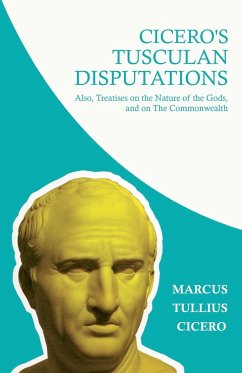This volume contains an English translation of "The Tusculanae Disputations", a five-book series written around 45 BC by Cicero, a Roman orator, statesman, philosopher and lawyer considered to be one of Rome's greatest orators and prose stylists. The books were originally written as an attempt to introduce Greek philosophy to Ancient Rome, especially stoicism. This volume will appeal to those with an interest in Greek philosophy, and it would make for a fantastic addition to collections of allied literature. Contents include: "The Tusculan Disputations", "The Nature of Gods", and "On the Commonwealth". Many vintage books such as this are becoming increasingly scarce and expensive. It is with this in mind that we are republishing this volume now in an affordable, modern, high-quality edition complete with an excerpt from W. Lucas Collins' "Cicero".








